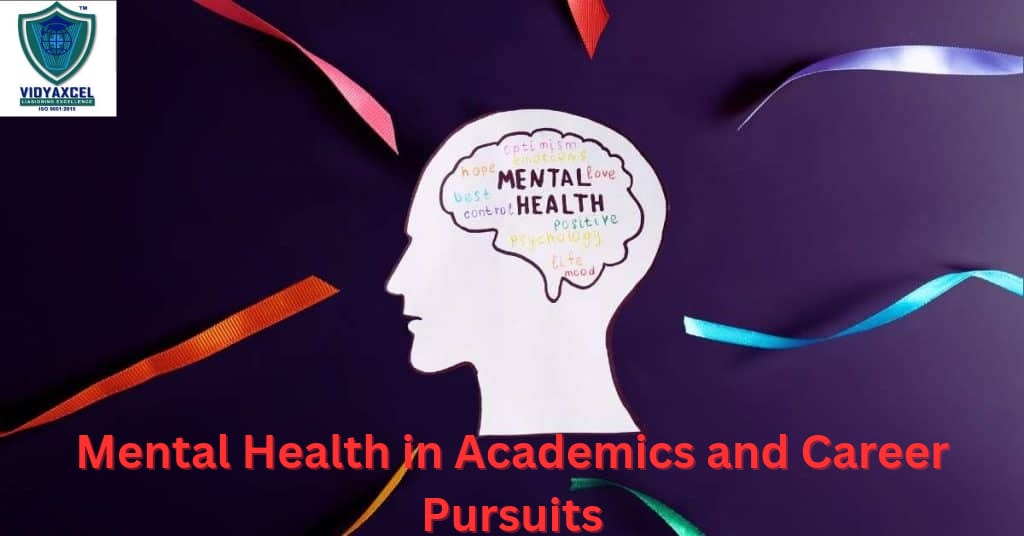Blog Details

30Oct
Mental Health in Academics and Career Pursuits
The link between mental health, academics, and career pursuits is increasingly recognized, especially as academic pressures and career demands rise. Here’s a closer look at how mental health intersects with education and career aspirations and some effective strategies for balancing these aspects.
1. Academic Pressures and Mental Health
- Performance Anxiety: Academic settings often create high expectations, leading to stress and anxiety. Students may feel constant pressure to excel, which can lead to burnout if unmanaged.
- Perfectionism: Many students set extremely high standards for themselves, leading to exhaustion and sometimes low self-esteem when they can't meet these goals.
- Social Comparison: Academic environments can foster a competitive spirit, which, while motivating, may also harm students’ mental health if they continually compare their achievements to peers.
Strategies:
- Mindfulness techniques can help students manage stress.
- Academic counseling and realistic goal-setting reduce self-imposed pressures.
2. Transition from Academics to Career
- Career Uncertainty: Many students worry about choosing the right career path, which can lead to stress and indecision.
- Job Market Competitiveness: With an increasingly competitive job market, the fear of not securing employment can intensify anxiety.
- Skill Gaps and Self-Esteem: The feeling of being underprepared for the workforce can be overwhelming, especially if students lack confidence in their skills.
Strategies:
- Career counseling and internships provide students with realistic job expectations.
- Networking events help bridge the gap between academic learning and career application.
3. Workplace Mental Health Challenges
- Burnout: Professionals, especially early in their careers, often experience burnout due to demanding work environments.
- Work-Life Balance: Juggling job responsibilities with personal life can lead to stress, particularly for those balancing careers with family or personal obligations.
- Imposter Syndrome: Many young professionals struggle with feeling inadequate, especially in competitive fields.
Strategies:
- Setting boundaries and practicing time management can help prevent burnout.
- Mentorship programs can offer guidance and help employees feel more competent in their roles.
4. Parental Involvement and Career Development
- Parental Expectations: Many students experience pressure from parents to pursue specific careers, which may clash with their interests.
- Supportive Parenting: Parents play a critical role in supporting mental health by encouraging realistic goals and promoting a balanced approach to academics and career planning.
Strategies:
- Open communication about career interests can alleviate pressure.
- Parents can support mental health by encouraging exploration rather than rigid expectations.
5. Building Resilience for Academic and Career Success
- Self-Care Practices: Engaging in physical exercise, social activities, and hobbies promotes a well-rounded life.
- Growth Mindset: Embracing challenges as opportunities to learn helps students and professionals remain motivated and resilient.
- Access to Mental Health Resources: Schools, universities, and workplaces with accessible mental health resources can make a significant difference in overall well-being.
Addressing mental health in academics and career pursuits is essential for fostering an environment where students and professionals thrive. Combining self-care, support systems, and realistic goal-setting enables individuals to reach their academic and career aspirations without compromising mental wellness.
FAQ's
Q1: What is the impact of academic pressure on mental health?
Academic pressure can lead to anxiety, stress, and burnout, especially when students feel the need to consistently perform at high levels. This pressure may also cause perfectionism and fear of failure, which can have long-term impacts on mental wellness.
Q2: How does career uncertainty affect mental health?
Career uncertainty can cause anxiety, especially for students approaching graduation or new graduates facing a competitive job market. This stress may manifest as sleeplessness, overthinking, or self-doubt.
Q3: Can mental health affect academic performance, and if so, how?
Yes, poor mental health can affect concentration, memory, and motivation, which in turn can impact academic performance. Addressing mental health concerns through counseling or relaxation techniques can help improve focus and productivity.
Q4: Are there resources available for students struggling with mental health issues related to academics?
Most educational institutions provide resources like counseling services, stress-management workshops, and peer support groups. Online platforms and helplines also offer support.
Q5: What role can parents play in supporting their children’s mental health in academics and career choices?
Parents can support by:
- Encouraging open communication about career interests.
- Avoiding excessive pressure and focusing on well-being.
- Being supportive of diverse career paths and realistic expectations.
Our Office: West Bengal, Maharashtra & Delhi.
For More Infomation about admission in Medical, Engineering, Management & Study in Overseas Details.
View Current Study Overseas, Medical, Engineering & Management Admission Details Video.





